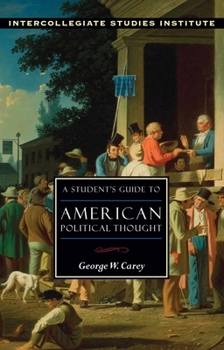A Student's Guide to American Political Thought
Select Format
Select Condition 
Book Overview
Who are the most influential thinkers, and which are the most important concepts, events, and documents in the study of the American political tradition? How ought we regard the beliefs and motivations of the founders, the debate over the ratification of the Constitution, the historical circumstances of the Declaration of Independence, the rise of the modern presidency, and the advent of judicial supremacy? These are a few of the fascinating questions...
Format:Paperback
Language:English
ISBN:1932236422
ISBN13:9781932236422
Release Date:September 2016
Publisher:Intercollegiate Studies Institute
Length:114 Pages
Weight:0.36 lbs.
Dimensions:0.3" x 5.3" x 8.0"
Grade Range:Grade 12 and higher
Customer Reviews
3 ratings
adequate introduction
Published by Jim C. , 4 years ago
This book is an adequate introduction to Am. political thought. The author introduces many of the basic questions. Read Forrest McDonald- "Novus Ordo Seclorum" for a more in-depth study and Mason & Leach -"In Quest of Freedom" for a broader coverage. Carey's opinion on church-state issues is totally wrong, so read Sidney E. Mead for a better view.
Great little read for college students
Published by Thriftbooks.com User , 17 years ago
This book explores the thoughts of the Founding Fathers as they worked to establish our political system. One of the unique facets of the founding of this nation is the rich historical perspective of those who examined human and cultural history and then made various determinations and choices in the founding of this civilization - why were certain forms of government included and others excluded, what was the intent and understanding of law, government and the nature of man in making these determinations? Carey, a government professor at Georgetown, examines the writings of the founders and explores their thoughts, motives and desires. Carey concludes several very fascinating things about our founders and their desired intent for this nation. First, many of the founders had a great distain for the concentration of power, considering the concentration itself to be tyranny, not waiting to see if the power were abused or not. Second, there is overwhelming evidence to support the concept that many of the founders believed that religion and virtue were absolute essentials in the fabric of this new society - to preserve and protect good government and to promote an orderly and decent society. Carey examines the influence of the Christian church on the foundation of this nation. In examining the writings of the founders, Carey determines that James Madison's Federalist #10 lays out the fundamental argument for a constitutional government and is essential for any student of American political thought to read and understand. The battle over states rights versus a centralized national government as well as the protection of minority rights from the majority are put forth in Federalist #10. From that foundation, further discussions of the founders addressed their thoughts about the separation of powers and the role of each branch - one interesting note was their concept and distain for judicial activism, a problem we are obviously facing in today's culture!
Outstanding
Published by Thriftbooks.com User , 19 years ago
Carey may be peerless in the ample insight he supplies concerning our Founder's intent. This short historical survey of American political thought processes and their conclusions provides a first-rate foundation for the neophyte, or the advanced pigeonholed in some specific corner of law or politics - quite suitable for the harried American. Though Carey holds a position (and after all what is education if not a search for the right answers?) he is remarkably adept at presenting other sides without torpedoing their thesis. But he doesn't need to, as that is done by carefully reading The Federalist. However, were it not for books like this, revision - conservative or liberal - would have a free hand, putting words in the Founder's mouth or obfuscating what can be complex Founding issues, not so much through the inertia of these concepts but by their subtleties. Unlike science where erroneous understandings are usually emphatically rejected by nature or refined analysis, this is what makes the Founding intent a minefield, more open to alteration. Unfortunately, English has not the precision of mathematics, but Carey points us to clarification from the Founders and they're reasonably clear, most often crystal. Right from the beginning Carey sets the table: "On what principles is the government based? How is authority allocated within it? What is its primary purpose? Are there limitations to its powers? How can it be altered? On what assumptions about human nature is it based?" Past civilizations were "ordained by the gods" or "given by a mythical lawgiver", but America's Founding was a reasoned struggle, not only at the Convention but over decades of debate and State testing, resulting in the "will of the people", not a god. The Federalist as defense of the proposed Constitution addressed these matters. It is, though, a "nuts and bolts" approach, writes Carey, not an extensive theoretical or philosophical treatise - practical vs. idealistic. And this is where much political thought separates from The Federalist, attempting to redraft its meaning to satisfy "the way things ought to be" regardless of what works, Right or Left - though both miss the truth according to Carey through their selective spin, serving agendas. An example follows fifty years after our most lethal war with resulting elevation of that Lincoln era, retroactively recasting the Constitution in light of our Declaration through Lincoln's moving speeches ("...a new nation conceived in liberty and dedicated to the proposition that all men are created equal"). Jefferson did say there that we "hold these truths to be self evident", that all "are created equal" with "certain unalienable Rights". So, rights and equality became paramount. For such interpretations, writes Carey "...democracy is primarily government 'for the people' not necessarily 'by the people'", bearing "a close relationship to those [ideals] that inspired the French Revolution". The Constitution is then judged by how w






